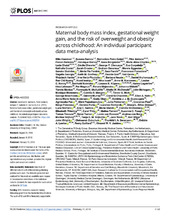| dc.Published | Voerman E, Santos S, Golab, Eggesbø MÅ, Iszatt N, Magnus P, Papadopoulou E, Stoltenberg C, Jaddoe VW. Maternal body mass index, gestational weight gain, and the risk of overweight and obesity across childhood: An individual participant data meta-analysis. PLoS Medicine. 2019;16(2):e1002744 | eng |
| dc.description.abstract | Background: Maternal obesity and excessive gestational weight gain may have persistent effects on offspring fat development. However, it remains unclear whether these effects differ by severity of obesity, and whether these effects are restricted to the extremes of maternal body mass index (BMI) and gestational weight gain. We aimed to assess the separate and combined associations of maternal BMI and gestational weight gain with the risk of overweight/obesity throughout childhood, and their population impact. Methods and findings: We conducted an individual participant data meta-analysis of data from 162,129 mothers and their children from 37 pregnancy and birth cohort studies from Europe, North America, and Australia. We assessed the individual and combined associations of maternal pre-pregnancy BMI and gestational weight gain, both in clinical categories and across their full ranges, with the risks of overweight/obesity in early (2.0–5.0 years), mid (5.0–10.0 years) and late childhood (10.0–18.0 years), using multilevel binary logistic regression models with a random intercept at cohort level adjusted for maternal sociodemographic and lifestyle-related characteristics. We observed that higher maternal pre-pregnancy BMI and gestational weight gain both in clinical categories and across their full ranges were associated with higher risks of childhood overweight/obesity, with the strongest effects in late childhood (odds ratios [ORs] for overweight/obesity in early, mid, and late childhood, respectively: OR 1.66 [95% CI: 1.56, 1.78], OR 1.91 [95% CI: 1.85, 1.98], and OR 2.28 [95% CI: 2.08, 2.50] for maternal overweight; OR 2.43 [95% CI: 2.24, 2.64], OR 3.12 [95% CI: 2.98, 3.27], and OR 4.47 [95% CI: 3.99, 5.23] for maternal obesity; and OR 1.39 [95% CI: 1.30, 1.49], OR 1.55 [95% CI: 1.49, 1.60], and OR 1.72 [95% CI: 1.56, 1.91] for excessive gestational weight gain). The proportions of childhood overweight/obesity prevalence attributable to maternal overweight, maternal obesity, and excessive gestational weight gain ranged from 10.2% to 21.6%. Relative to the effect of maternal BMI, excessive gestational weight gain only slightly increased the risk of childhood overweight/obesity within each clinical BMI category (p-values for interactions of maternal BMI with gestational weight gain: p = 0.038, p < 0.001, and p = 0.637 in early, mid, and late childhood, respectively). Limitations of this study include the self-report of maternal BMI and gestational weight gain for some of the cohorts, and the potential of residual confounding. Also, as this study only included participants from Europe, North America, and Australia, results need to be interpreted with caution with respect to other populations. Conclusions: In this study, higher maternal pre-pregnancy BMI and gestational weight gain were associated with an increased risk of childhood overweight/obesity, with the strongest effects at later ages. The additional effect of gestational weight gain in women who are overweight or obese before pregnancy is small. Given the large population impact, future intervention trials aiming to reduce the prevalence of childhood overweight and obesity should focus on maternal weight status before pregnancy, in addition to weight gain during pregnancy. | en_US |

